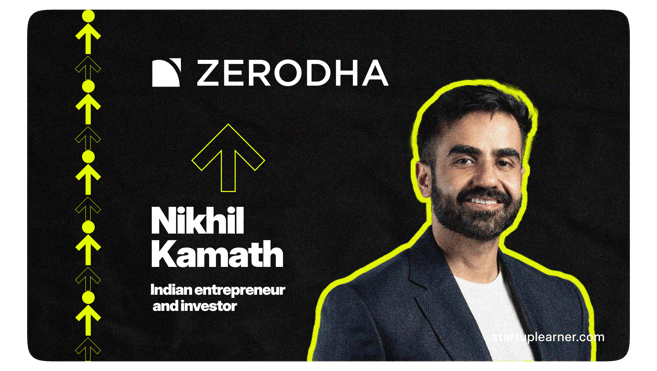Nikhil Kamath: How a School Dropout Bootstrapped Zerodha Into India’s Top Brokerage Firm
FOUNDERS
Startup Learner
4/17/20252 min read



Introduction
In a startup world obsessed with massive fundraising rounds and Ivy League pedigrees, Nikhil Kamath's story stands out.
A school dropout who taught himself to trade, Nikhil co-founded Zerodha, which went on to become India’s largest stock brokerage — entirely bootstrapped.
His journey is a powerful reminder that execution beats credentials every time.
Early Life and Background
Nikhil Kamath was born in 1986 in Bangalore, India.
Traditional academics didn’t interest him — he dropped out of school at 14 and started working at a call center to support himself.
While working night shifts, he became fascinated with stock markets.
He started trading equities using his modest salary, making mistakes, learning through experience, and gradually developing an instinct for the markets.
Despite having no formal education in finance, he honed skills most textbooks couldn’t teach — risk management, market psychology, and gut-level decision-making.
This scrappy self-education would become the foundation for his biggest venture.
The Big Idea: Democratizing Trading for Everyone
Along with his older brother Nithin Kamath, who was also a trader, Nikhil noticed a major gap in India's stock trading landscape:
Trading was expensive, with brokers charging hefty commissions.
The platforms were clunky, outdated, and intimidating for beginners.
Access to stock markets was largely restricted to the urban elite.
The Kamath brothers asked a simple question:
Why should trading be complicated and expensive?
In 2010, they launched Zerodha (zero + "Rodha" meaning barrier in Sanskrit) — a brokerage firm offering zero brokerage for delivery trades and ultra-low fees for intraday trades.
Their mission was to remove all barriers to investing in Indian stock markets.
Building the Company: A Bootstrap Masterclass
Unlike most startups, Zerodha did not chase venture capital or aggressive expansion at the cost of profits.
Instead, Nikhil and Nithin focused on:
Building a superior trading platform (Kite)
Offering transparent, low-cost pricing
Educating new investors through Zerodha Varsity
Creating customer-first products like smallcase, Coin, and Rainmatter
Their growth was slow and steady — but organic and profitable.
By 2020, Zerodha had over 5 million clients and handled about 15% of all retail trading volumes in India.
As of 2023, estimates suggest Zerodha generates over ₹2,500+ crores ($300M+) in annual profit — without raising a single rupee from outside investors.
Lessons for Founders
Nikhil Kamath’s journey offers brutally honest and refreshing lessons:
1. You don't need a degree to succeed.
Execution and persistence matter more than paper qualifications.
2. Bootstrap if you can.
Owning 100% of your company offers long-term freedom and control.
3. Solve boring but painful problems.
Zerodha isn’t "sexy" — but it fixed broken parts of India's financial system.
4. Education drives adoption.
Zerodha Varsity became one of India's most trusted financial education platforms, building trust and loyalty.
5. Focus on profitability, not vanity metrics.
Zerodha chose steady profitability over growth-at-all-costs, which shielded them during market downturns.
The Impact
Zerodha democratized stock trading in India.
It lowered barriers for millions of young Indians to invest and participate in wealth creation.
The platform's success inspired a new wave of fintech startups focused on transparency, simplicity, and education-first models.
Today, Zerodha stands as a case study for sustainable entrepreneurship — proof that high valuations aren't the only measure of success.
Nikhil, meanwhile, continues to invest in startups, support financial literacy initiatives, and even explore new ventures like asset management through True Beacon.
Conclusion
Nikhil Kamath’s story challenges every conventional belief about startup success.
No degree. No funding. No viral marketing blitz.
Just relentless focus, product excellence, and real customer love.
For new founders, the lesson is powerful:
You don't need permission to build something meaningful. You just need courage, patience, and relentless execution.



